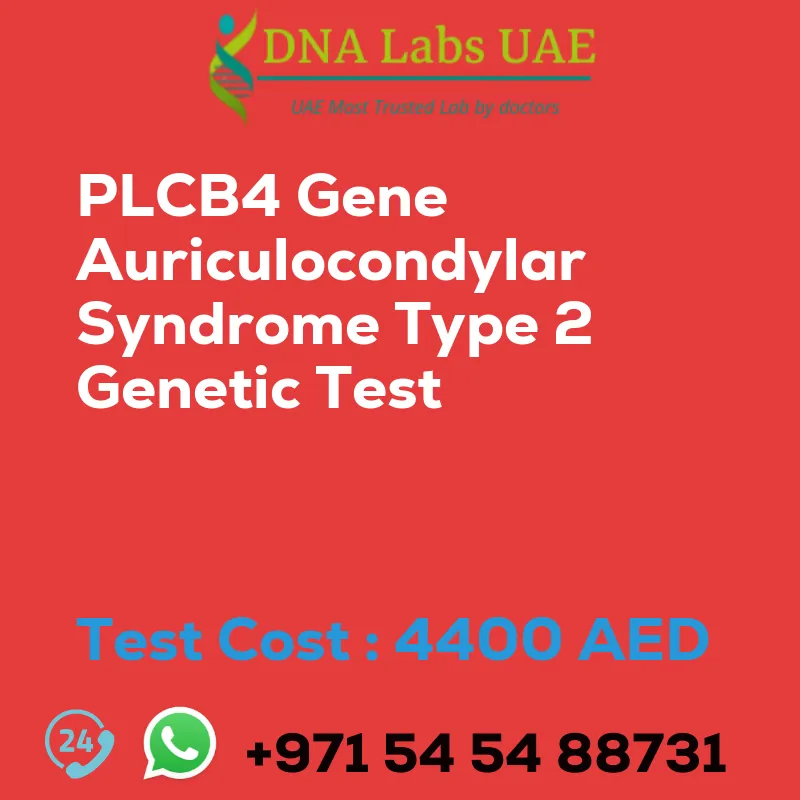PLCB4 Gene Auriculocondylar syndrome type 2 Genetic Test
At DNA Labs UAE, we offer the PLCB4 Gene Auriculocondylar syndrome type 2 Genetic Test. This test is designed to identify mutations or variations in the PLCB4 gene that may be responsible for Auriculocondylar syndrome type 2, a rare genetic disorder characterized by abnormalities of the ears, mandible (lower jaw), and other facial structures.
Test Details
The PLCB4 Gene Auriculocondylar syndrome type 2 Genetic Test is performed using NGS (Next-Generation Sequencing) technology. NGS genetic testing allows for the analysis of multiple genes simultaneously, providing a comprehensive assessment of an individual’s genetic makeup. In the case of Auriculocondylar syndrome type 2, this test can help confirm a diagnosis by detecting variations in the PLCB4 gene.
Test Components and Price
- Test Name: PLCB4 Gene Auriculocondylar syndrome type 2 Genetic Test
- Components: NGS Technology
- Price: 4400.0 AED
- Sample Condition: Blood or Extracted DNA or One drop Blood on FTA Card
- Report Delivery: 3 to 4 Weeks
- Test Type: Dysmorphology
- Doctor: Pediatrics
- Test Department: Genetics
Pre Test Information
Prior to undergoing the PLCB4 Gene Auriculocondylar syndrome type 2 Genetic Test, it is important to provide the clinical history of the patient. Additionally, a genetic counseling session may be conducted to draw a pedigree chart of family members affected by the disorder. This will help in the interpretation of the test results and provide valuable information for genetic counseling and management of the condition.
How the Test Works
To perform the PLCB4 Gene Auriculocondylar syndrome type 2 Genetic Test, a DNA sample is required. This can be obtained through a blood sample or cheek swab. The DNA is then sequenced using high-throughput sequencing technology, allowing for the detection of variations in multiple genes simultaneously. The results of the test can confirm a diagnosis of Auriculocondylar syndrome type 2 and provide important information for further medical guidance.
Please note that genetic testing should always be performed and interpreted by a qualified healthcare professional or genetic counselor who specializes in genetics. They can provide appropriate counseling and guidance based on the test results.
| Test Name | PLCB4 Gene Auriculocondylar syndrome type 2 Genetic Test |
|---|---|
| Components | |
| Price | 4400.0 AED |
| Sample Condition | Blood or Extracted DNA or One drop Blood on FTA Card |
| Report Delivery | 3 to 4 Weeks |
| Method | NGS Technology |
| Test type | Dysmorphology |
| Doctor | Pediatrics |
| Test Department: | Genetics |
| Pre Test Information | Clinical History of Patient who is going for PLCB4 Gene Auriculocondylar syndrome type 2 NGS Genetic DNA Test. A Genetic Counselling session to draw a pedigree chart of family members affected with PLCB4 Gene Auriculocondylar syndrome type 2 NGS Genetic DNA Test gene PLCB4 |
| Test Details |
The PLCB4 gene is associated with Auriculocondylar syndrome type 2, which is a rare genetic disorder characterized by abnormalities of the ears, mandible (lower jaw), and other facial structures. NGS (Next-Generation Sequencing) genetic testing is a type of genetic test that can analyze multiple genes simultaneously, providing a comprehensive assessment of an individual’s genetic makeup. In the case of Auriculocondylar syndrome type 2, NGS genetic testing can be used to identify mutations or variations in the PLCB4 gene that may be responsible for the disorder. NGS genetic testing typically involves obtaining a DNA sample, usually through a blood sample or cheek swab. The DNA is then sequenced using high-throughput sequencing technology, allowing for the detection of variations in multiple genes simultaneously. The results of the test can help confirm a diagnosis of Auriculocondylar syndrome type 2 and provide valuable information for genetic counseling and management of the condition. It’s important to note that genetic testing should be performed and interpreted by a qualified healthcare professional or genetic counselor who specializes in genetics. They can provide appropriate counseling and guidance based on the test results. |








